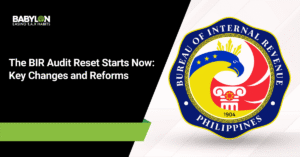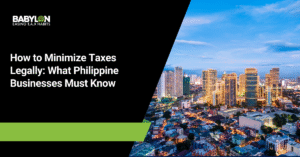The Bureau of Internal Revenue (BIR) of the Philippines has taken a significant step toward digital convenience with the issuance of Revenue Regulations (RR) No. 3-2016, allowing the voluntary payment of taxes using credit, debit, and prepaid cards. This regulation offers flexibility and modernizes the tax payment process, but also outlines strict guidelines to ensure accountability and security.
In this article, we break down what RR No. 3-2016 means for taxpayers, banks, and service providers.
Voluntary Card Payment of Taxes: Convenience with Responsibility
Under RR No. 3-2016, paying taxes through credit, debit, or prepaid cards is completely optional. This mode of payment is designed for convenience, particularly for those who prefer digital transactions. However, it’s important to note that all associated fees including convenience fees and merchant discount rates are shouldered by the taxpayer.
The total amount due to the BIR must be paid in full. No deductions for processing fees are allowed.
Who Can Accept Card Payments?
Only Authorized Agent Banks (AABs) that act as Acquirers can accept tax payments through cards. Before doing so, AABs must meet specific requirements:
- Their Card Payment Information System must be tested and approved by the BIR.
- They must enter into a Service Level Agreement (SLA) with the BIR.
- A list of enabled card issuers must be submitted and kept updated with the BIR.
Any changes to this list must be reported in writing to the BIR within five (5) days.
Philippine-Issued Cards Only
For compliance and security reasons, only Philippine-issued cards under the taxpayer’s name are allowed for tax payment. Foreign-issued cards or cards registered under another person’s name are not accepted.
Selecting an Electronic Payment Service Provider (EPSP)
Taxpayers may choose from approved online payment platforms provided by Electronic Payment Service Providers (EPSPs). These platforms act as intermediaries, enabling secure and efficient transaction processing.
If the EPSP is not the AAB-Acquirer, it must electronically submit transaction details to the BIR every day by 9:00 AM the following day.
Payment Confirmation and Validity
Once a tax payment is made using a card, the system-generated confirmation receipt provided by the AAB-Acquirer indicates the official date and time of payment. However, the payment is only considered final once the BIR actually receives the funds.
Taxpayers remain liable for the tax until the BIR confirms receipt, regardless of the confirmation notice.
No Automatic Chargebacks or BIR Accountability for Errors
RR No. 3-2016 makes it clear: the BIR is not responsible for issues between taxpayers and card issuers. This includes:
- Disputes over unauthorized charges
- Erroneous postings
- Non-payment to the card issuer
In cases where a wrong payment is made, taxpayers cannot simply request a “chargeback.” Instead, they must apply for a refund or tax credit in accordance with existing BIR procedures.
Timely Reporting and Remittance by AABs and EPSPs
To maintain financial integrity and transparency:
- AAB-Acquirers must report and remit all tax payments to the BIR and Bureau of the Treasury (BTr) promptly.
- EPSPs must submit daily reports, with strict penalties in place for delays or errors in reporting.
These requirements follow existing agreements and Treasury Circular No. 03-2013.
Electronic Filing Required at Launch
Initially, taxpayers opting to pay via card must also electronically file the corresponding tax return. Over time, the BIR plans to enable other filing channels, pending system upgrades.
Data Security and Encryption Standards
To safeguard sensitive taxpayer information, RR No. 3-2016 mandates the use of:
- Encryption
- Secure authentication
- Industry-standard cybersecurity measures
These protocols aim to protect the identity, data, and transaction integrity of all taxpayer-cardholders.
Conclusion: A Move Toward Modern Tax Compliance
Revenue Regulations No. 3-2016 marks a progressive shift in how taxes are paid in the Philippines. By allowing voluntary card payments, the BIR is embracing digital convenience while ensuring accountability through clear guidelines for banks, payment processors, and taxpayers.
However, it’s crucial for taxpayers to understand their responsibilities, especially regarding fees, refunds, and proper card usage. With the right information and tools, paying taxes has never been more accessible or more secure.
DISCLAIMER:This article is developed by subject matter experts at Babylon2k. This is for general information only and does not constitute expert advice. It is based on current regulations and may not account for all related topics. Any tax or compliance guidance provided cannot be used to avoid penalties or promote specific actions. Laws and interpretations may change over time, which could affect the accuracy of this report. We are not obligated to update this advisory if new regulations arise.
How We Can Help
Babylon2k’s B.E.T.H. can also help you when you need more information and clarification on how this regulation affects you. Learn More >
☎️ Get in Touch!
- Request a Free Consultation | Request Consult
- Message us on Viber/ Whatsapp Number @ +63-927-945-3382.
- Email us directly at [email protected]






